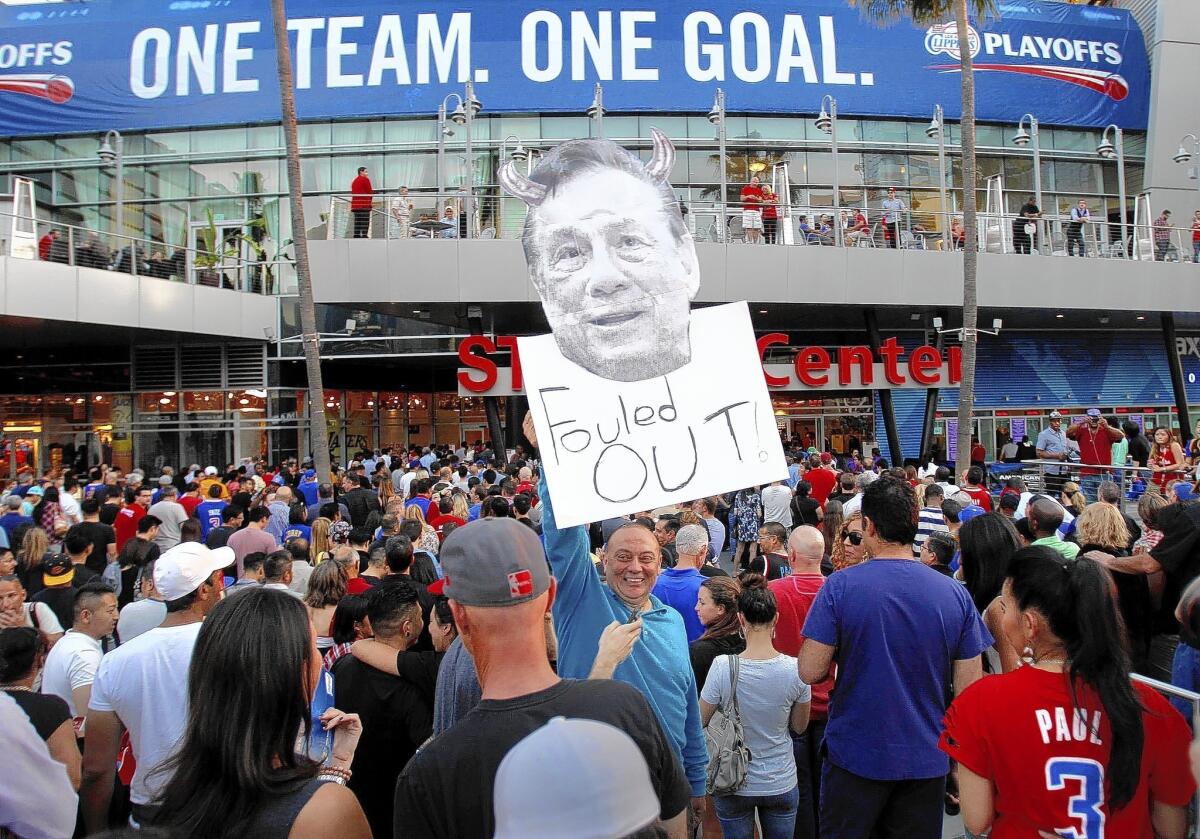Column: The real public service Donald Sterling has done

You didn’t have to be a Clippers fan to root for the players this season. Their playoff loss on Thursday night was heartbreaking, especially given all the turmoil they’ve endured.
The only upside to this season-ending defeat is that it signifies the end of Donald Sterling’s career as a basketball mogul.
Sterling’s been banned for life from the NBA. His fellow team owners are expected to vote soon to strip the team from him. But he’s not going down without a fight; he’s already refused to pay the $2.5-million fine the league imposed for his disparaging comments about blacks that were captured on a recording. If the NBA does not back down, he’s threatening to sue.
That’s classic Sterling. He’s always thrown money around and silenced his detractors — settling discrimination cases before the facts reach a jury, padding the bank accounts of civil rights groups, reveling in his image as life-of-the-party sports tycoon.
Selling the Clippers now will make Sterling many millions of dollars. But this is about more than a businessman’s bottom line.
Sterling has hung his social standing for 33 years on being an NBA owner and the adulation that brings. One hundred percent of Clippers’ fans and all his players love him, he told CNN.
I get the feeling that for all his money, that delusion is the thing that matters to him most.
::
Since the audiotape surfaced three weeks ago, I’ve been trying to understand why I don’t feel appropriately outraged by Sterling’s race-based insults.
His contempt for black people is clear. He doesn’t want us at his Clippers games or in his friends’ Instagram photos — unless, of course, we are giving him an award.
But I don’t really care whether Sterling likes black people. I don’t want a man like that on my team. He’s a bigot and a bully whose social peccadilloes are magnified by his stunning stupidity.
I do care if he refuses to rent to black people or pay them what they deserve — both of which he’s been accused of doing in lawsuits over the years.
At this point, what’s just as disturbing is the circus atmosphere created when Don and Shelly take their antebellum sideshow on the road — and we wait and wonder how much weirder this is going to become.
Their television performances have been painful to watch. Sterling and his wife both want to hold on to the Clippers so badly, they come off as desperately loopy and comically out-of-touch.
“It’s part tragedy and part farce,” said USC law professor Jody Armour. “That’s some of what attracts us.”
The Sterling saga gives us a chance to castigate a public bigot without examining our own attitudes or considering the actual damage that broad racism inflicts.
“It’s cut and dried,” said Armour, the author of “Negrophobia and Reasonable Racism: The Hidden Costs of Being Black in America.” “We can all agree that racism like this is bad. It’s Archie Bunker, it’s Bull Connor … we recognize that. The choir is all together now, singing as one.
“But we can’t let this distract us from what real racism is. The kind of racial injustices that black folks face today are from historic inequalities that have accumulated over generations,” he said. “Overreact to this and we’re scapegoating Donald Sterling for sins of discrimination that go way beyond him.”
Still, the collective chorus of outrage has been heartening. It’s fun watching Sterling squirm. “People are calling from all over the world, asking ‘Are you a racist?’” he complained to CNN.
Wouldn’t it be great if bigotry could be so easily dispatched?
We find the ogre, chase him into the woods with our pitchforks and torches and return to our racist-free lives.
::
I think we’ve spent more public attention on Donald Sterling than the man deserves. Civil rights attorney Connie Rice put it best: He’s just an old man with no filter; a relic it’s time to retire.
But he’s done the country a public service by reminding us how pernicious prejudice can be.
I’ve realized I’m too jaded to be shocked by what Sterling said; I’ve heard worse from readers who can’t resist slinging racial slurs when they find fault with my column.
Still, I can’t help but wonder: Is Sterling part of a small group with views so out-of-sync with the mainstream that they constitute news? Or do the views he expressed in private, and later on TV, reflect what many others really think but know better than to reveal?
I’m going with the outlier explanation; my spirit needs that to heal. And I’m encouraged by the soul-searching among folks horrified by the attitudes that Sterling unwittingly displayed.
Entertainment agent Paul Haas has been a Clippers season ticket holder for 16 years, with pricey courtside seats. He felt awkward even walking into Staples Center this week.
“I’ve been pouring money into that team, and I feel guilty and ashamed for ignoring what we’ve known for years,” Haas told me. “Everyone turned a blind eye, until it was so in our face we couldn’t afford to look away.”
It’s reminded him of how hard it is to dislodge discrimination. “I cannot believe we’re still going through this. You can drink at my water fountain, you can sit where I sit.... But don’t live in my neighborhood. Is it ever going to end?”
More to Read
Sign up for Essential California
The most important California stories and recommendations in your inbox every morning.
You may occasionally receive promotional content from the Los Angeles Times.











